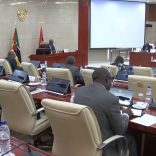Mozambique: New institute to manage public works
Mozambique, Zimbabwe sign Búzi pact

Minister of Public Works, Housing and Water Resources João Machatine exchanges files with Perrence Shiri, Zimbabwe's Lands, Agriculture, Water, Climate and Rural Resettlement Minister (left) after the signing of the agreement for cooperation on the development, management and sustainable utilisation of the water resources of the Buzi watercourse in Mutare, Zimbabwe, yesterday. [Picture: Tinai Nyadzayo]
Mozambique and Zimbabwe have signed a bilateral agreement on cooperation on the development, management and sustainable utilisation of the water resources in the Buzi Watercourse.
Zimbabwe’s Lands, Agriculture, Water, Climate and Rural Resettlement Minister Perrence Shiri and his Mozambican counterpart, Minister of Public Works, Housing and Water Resources Joao Osvaldo Moises Machatine, signed the agreement on behalf of the two countries.
The agreement, which is expected to be in effect for 10 years, will set the ball rolling in the implementation of the Buzi, Pungwe and Save (BUPUSA) Tri-basin project, meant to strengthen cooperation and institution building in the three river basins.
The project is being financed by the governments of Germany and United Kingdom through the German Society for International Cooperation (GIZ) and UKAID.
The project commenced in 2018 and is expected to end this year.
Global Water Partnership Southern Africa is implementing the project on behalf of SADC.
In July 2016, Zimbabwe and Mozambique signed the Pungwe Basin water sharing agreement, which sought to institutionalise transboundary water management in the Pungwe Basin. Negotiations are currently underway on the Save water sharing agreement.
Speaking during the signing ceremony at a local hotel in Mutare, Shiri said the project presented an endeavour from both governments to address key social and economic challenges faced by the communities from both countries.
He said the recent Cyclone Idai disaster that affected the three basins is testimony to the need to strengthen cooperation particularly on data and information sharing.
“Our two governments recognised the need for efficient joint management, coordination, planning and development of the water resources of the Buzi to overcome current and future problems of supplying water of adequate quantity and quality to our communities in the basin,” he said.
“The signing of this bilateral agreement therefore represents an endeavour by the two governments to address key social, economic and environmental and institutional challenges in the shared river basin.”
Shiri said the agreement would also strengthen institutions such as Zimbabwe National Water Authority and ARA Centra.
“The end result will definitely stimulate and support appropriate development-oriented investments in the basin that will contribute to poverty alleviation and environmental stability. We need to continue guarding against water pollution in all its various forms emanating from gold panning, deforestation and stream bank cultivation. We also need to address saline water intrusion especially in Mozambique, mainly caused by low flows experienced during the dry seasons,” said Minister Shiri.
He said the two governments were also aware of the need to protect the environment and to promote sustainable development in the river basins, especially in the extraction of minerals through gold panning.
“The devastating effects of gold panning that is taking place in our shared river basins need to be stopped. I am very happy to say that the two governments are taking corrective measures to reduce further environment degradation and pollution of water bodies,” he said.
Minister Machatine said the close relations between Zimbabwe and Mozambique can be traced back to the liberation struggles of the two countries.
He said the agreement was a commitment to the SADC regional thrust on sustainable water resources management.
“The sustainable utilisation of water is inspired by the need to deepen bilateral cooperation. The SADC legal framework is important for Mozambique, a downstream country. More than 50 percent of our water resources are generated in other upstream countries hence the need to develop policies that seek to protect the water source,” he said.
Minister Machatine said the Buzi water basin has about has a huge potential of about 45 000 hectares of irrigation to cover almost two million people as well as for the generation of about 94MW of electricity for communities in Mavhudzi (Mavuzi) and Chikamba (Chicamba).
“We are expecting to establish a 45 000 hactares irrigation project. We are also going to embark on the generating 94 megawatts of electricity,” said minister Machatine.
“We need to improve the livelihoods of our people from both countries. The communities must benefit from this development to sustain their lives,” he said.
The two countries share Buzi, Pungwe and Save rivers.












Leave a Reply
Be the First to Comment!
You must be logged in to post a comment.
You must be logged in to post a comment.